- Home
- Paullina Simons
Tatiana and Alexander Page 10
Tatiana and Alexander Read online
Page 10
He was then employed as a shoemaker, which amused Alexander (“Dad, what do you know about making shoes?”).
That job lasted only a few days. “What? Shoe-making isn’t safe either?” Alexander asked.
Apparently it wasn’t. Foreigners had been known to make galoshes and mountain boots for good Soviet citizens to escape through marshes and through mountains.
A somber Harold came home one April evening in 1935 and instead of cooking (it was Harold who cooked dinner for his family now), sat down heavily at the table and said that a Party Obkom man had come to see him at the school where he was working as a floor sweeper and asked him to find a new place to live. “They want us to find our own rooms. Be a little more independent.” He shrugged. “It’s only right. We’ve had it relatively easy the last four years. We need to give something back to the state.” He paused and lit a cigarette.
Alexander saw his father glance at him furtively. He coughed and said, “Well, Nikita has disappeared. Maybe we can take his bathtub.”
There was no room for the Barringtons in all of Moscow. After a month of looking, Harold came home from work and said, “Listen, the Obkom man came to see me again. We can’t stay here. We have to move.”
“By when?” Jane exclaimed.
“Two days from now. They want us out.”
“But we have nowhere to go!”
Harold sighed. “They offered me a transfer to Leningrad. There is more work—an industrial plant, a carpentry plant, an electricity plant.”
“What, no electricity plants in Moscow, Dad?”
Harold ignored Alexander. “We’ll go there. There’ll be more rooms available. You’ll see. Janie, you’ll get a job at the Leningrad public library.”
“Leningrad?” Alexander exclaimed. “Dad, I’m not leaving Moscow. I got friends here, school. Please.”
“Alexander, you’ll start a new school. Make new friends. We have no choice.”
“Yes,” Alexander said loudly. “But once we had a choice, didn’t we?”
“Alexander! You will not raise your voice to me,” Harold said. “Do you hear?”
“Loud and clear!” shouted Alexander. “I’m not going. Do you hear?”
Harold jumped up. Jane jumped up. Alexander jumped up.
Jane said, “No, stop it, stop it, you two!”
“You will not speak to me this way,” Harold said. “We are moving, and I don’t want to talk another minute about it.”
He turned to his wife and said, “Oh, and one more thing.” Sheepishly, he coughed. “They want us to change our name. To something more Russian.”
Alexander scoffed. “Why now? Why after all these years?”
“Because!” Harold shouted, losing control. “They want us to show our allegiance! You’re going to be sixteen next month. You’re going to register for the Red Army. You need a Russian name. The fewer questions, the better. We need to be Russians now. It will be easier for us.” He lowered his gaze.
“God, Dad,” Alexander exclaimed. “Will this ever stop? We can’t even keep our name anymore? It’s not enough to kick us out of our home, to move us to another city? We need to lose our name, too? What else have we got?”
“We are doing the right thing. Our name is an American name. We should have changed it long ago.”
“That’s right,” said Alexander. “The Frascas didn’t. The van Dorens didn’t. And look what happened to them. They’re on vacation. Extended vacation, right, Dad?”
Harold raised his hand to Alexander, who pushed him away. “Don’t touch me,” he said coldly.
Harold tried again. Alexander pushed him away again, but this time he didn’t let go of his father’s hands. He did not want his mother to see him lose his temper, his poor mother, who stood shaking and crying, clasping her hands at her two men, pleading, “Darlings, Harold, Alexander, I beg you, stop it, stop it.”
“Tell him to stop it!” Harold said. “You’ve raised him like this. No respect for anybody.”
His mother came over to Alexander and grabbed hold of his arms. “Please, son,” she said. “Calm down. It’ll be all right.”
“You think so, Mom? We’re moving cities, we’re changing our name just like this hotel. You call that all right?”
“Yes,” she said. “We still have each other. We still have our lives.”
“How the definition of being all right changes,” said Alexander, extricating himself from his mother and taking his coat.
“Alexander, don’t walk out that door,” said Harold. “I forbid you to walk out that door.”
Alexander turned to his father, looked him in the eye, and said, “Go ahead and stop me.”
He left and did not come back home for two days. And then they packed up and left the Kirov Hotel.
His mother was drunk and unable to help carry the suitcases to the train.
When did Alexander first begin to feel, to know, to sense that something was desperately wrong with his mother? That was the point: something wasn’t desperately wrong with her all at once. At first she had been slightly not herself, and it wasn’t for Alexander to say what was the matter with his adult parent. His father could have seen, but his father had no eyes. Alexander knew his father was the kind of man who simply could not keep the personal and the global in his head at the same time. But whether Harold was aware and plainly ignored it, or whether he was actually oblivious, didn’t matter, and it didn’t change the simple fact that Jane Barrington gradually, without fanfare, without much to-do, much introduction and much warning permanently ceased to be the person she once was and became the person she wasn’t.
CHAPTER EIGHT
Ellis Island, 1943
EDWARD CAME IN TO check on Tatiana in the middle of August. She’d been in America seven weeks. She was sitting in her usual place by the window, with a naked and diapered Anthony on her lap, tickling him between his toes. She had been feeling much better, her breathing was deep, she was almost not coughing. She had not seen blood in her cough for a month. The New York air was doing her good.
Edward took the stethoscope from her chest. “Listen, you are doing much better. I think I’m going to have to discharge you.”
Tatiana said nothing.
“Do you have anywhere to go?” Edward paused. “You will need to get a job.”
“Edward,” said Tatiana, “I like it here.”
“Well, I know. But you’re all better.”
“I was thinking, maybe I work here? You need more nurse.”
“You want to work at Ellis?”
“Very much.”
Edward talked to the chief surgeon at the Public Health Department, who came in to talk to Tatiana, informing her that she would have to be put on something called a three-month probation to see if she could keep up with the work, if she had the necessary skills. He told her that she would not be employed by Ellis Island but by the PHD and as such would sometimes have to pull duty at the New York University hospital downtown if they had a shortage of nurses there. Tatiana agreed, but asked if she could live at Ellis, “maybe work as night nurse?” The surgeon was not keen. “Why would you want to? You could get yourself an apartment right across the bay. Our citizens don’t live here.”
Tatiana explained as best she could that she hoped some of the detained refugees at Ellis could look after her son while he was still small, and though she wanted to work, she had no one to leave him with and to make matters easier for everyone she could stay in her current convalescent room.
“But it’s so small!”
“One room just right for me.”
Tatiana asked Vikki to buy her a uniform and shoes. “You know you only get two pairs of shoes?” said Vikki. “War rationing. You want one of them to be nurse’s shoes?”
“I want my only pair to be nurse’s shoes,” said Tatiana. “What I need more shoes for?”
“What if you wanted to go dancing?” asked Vikki.
“Go where?”
“Dancing! You know, do a
little lindy hop, a little jitterbug? What if you wanted to look nice? Your husband isn’t coming back, is he?”
“No,” said Tatiana, “my husband isn’t coming back.”
“Well, you definitely need nice new shoes if you’re going to be a widow.”
Tatiana shook her head. “I need nurse’s shoes and white uniform, and I need to stay at Ellis, and I not need nothing else.”
Vikki shook her head, her eyes flickering. “It’s anything else. When can you come have dinner with us? How about this Sunday? Dr. Ludlow says you’re being discharged.”
Vikki bought Tatiana a uniform that was slightly big, and shoes that were the right size, and after Edward discharged her, she continued to do what she had been doing in her white hospital gown and gray hospital robe—look after the foreign soldiers who were shipped to New York, treated, and then sent elsewhere on the continent to do POW labor duty. Many of them were German soldiers, some were Italian, some Ethiopian, one or two French. There were no Soviet soldiers.
“Oh, Tania, what am I going to do?” Vikki was in her room, sitting on the bed, while Tatiana lay in bed, breastfeeding Anthony. “Are you on a break?”
“Yes, a lunch break.” Tatiana smiled, but the irony went past Vikki’s unlistening ears.
“Who takes care of your boy while you do rounds?”
“I take him with me. I put him on empty bed while I take care of soldiers.” Brenda palpitated every time she saw it, but Tatiana didn’t like to leave him sleeping alone in the room, so she didn’t care how much Brenda palpitated. If only there had been more immigrants, someone could take care of her baby while she worked. But there were very few people coming through Ellis. Twelve in the month of July, eight in the month of August. And they all had their own children, their own problems.
“Tania! Can we talk about my situation? You know, don’t you, that my husband is home with me now.”
“I know. Wait little while,” Tatiana said. “Maybe war will take him again.”
“That’s the problem! They don’t want him. He can’t operate heavy machinery. He’s been honorably discharged. He wants us to have a baby. Can you even imagine?”
Tatiana was quiet. “Vikki, why you get married?”
“It was war! What do you mean, why did I get married? Why did you get married? He was going off to war, he asked me to marry him, I said yes. I thought, what’s the harm? It’s war. What’s the worst that can happen?”
“This,” said Tatiana.
“I didn’t think he’d be coming back so soon! I thought he’d be back for Christmas, once, twice. Maybe he’d be killed. Then I could say I had been married to a war hero.”
“Is he not war hero now?”
“It doesn’t count—he’s alive!”
“Oh.”
“Before he came back I had been going dancing every weekend, but now I can’t do anything. God!” she exclaimed. “Being married is a real drag.”
“Do you love him?”
“Sure.” Vikki shrugged. “But I love Chris, too. And two weeks ago, I met a radiologist who was nice…but it’s all over for that now.”
“You right,” Tatiana said. “Marriage very inconvenient.” She paused. “Why do you not get, what is it called?”
“A divorce?”
“Yes.”
“What are you, crazy? What kind of country do you come from? What kind of customs do you have there?”
“In my country,” said Tatiana, “we faithful to our husbands.”
“He wasn’t here! Surely I can’t be expected to be faithful to him when he is thousands of miles away, and getting up to no good in the Far East? As far as divorce…I’m too young to get divorced.”
“But not too young to be widow?” Tatiana flinched when she said it.
“No! There is an honor that comes with being a widow. I can’t be a divorcée. What am I, Wallis Simpson?”
“Who?”
“Tania, you’re doing well. Brenda tells me, albeit grudgingly”—Edward smiled—“that you are very good with the patients.” Edward and Tatiana were walking between the patient beds. Tatiana was carrying an awake and alert Anthony.
“Thank you, Edward.”
“Are you afraid your boy is going to get sick from being around sick people?”
“They not sick,” Tatiana replied. “Right, Anthony? They wounded. I bring my boy, and he makes them happy. Some of them have wives and sons back home. They touch him and they happy.”
Edward smiled. “He is a very fine boy.” Edward stroked Anthony’s dark head. Anthony paid Edward back by grinning toothlessly. “You take him outside?”
“All time.”
“Good. Babies need fresh air. And you, too.” He cleared his throat. “You know, on Sundays the doctors from NYU and PHD play softball in Sheep Meadow, in Central Park, and the nurses come to cheer us on. Would you like to come this Sunday with Anthony?”
Tatiana was too flustered to answer. They were on the stairs when they heard the clomping of high heels. “Edward?” a voice screeched from the ground floor. “Is that you?”
“Yes, sweetheart, it’s me.” Edward’s voice was calm.
“Well, thank goodness I found you. I’ve been looking everywhere for you.”
“I’m right here, sweetheart.”
Mrs. Ludlow walked up the stairs, panting, and the three of them stopped on the landing. Tatiana held her baby closer. Disapprovingly, Edward’s wife eyed Tatiana and said, “A new nurse, Edward?”
“Nurse Barrington? Have you met Marion?”
“Yes,” said Tatiana.
“No, we never met,” declared Marion. “I never forget a face.”
“Mrs. Ludlow,” said Tatiana. “We meet every Tuesday in dining room. You ask me where Edward, and I say I don’t know.”
“We have never met,” repeated Mrs. Ludlow, with extra firmness to her voice.
Tatiana said nothing. Edward said nothing.
“Edward, can I talk to you in private? And you,” she added, glaring at Tatiana, “are too young to be carrying a child. You’re not carrying him correctly. You’re not holding his head. Where is the baby’s mother?”
“Marion, she is the baby’s mother,” said Edward.
Mrs. Ludlow was critically silent for a moment, then tutted and before anyone could say anything, she tutted again with emphasis, muttered the word “immigrants” and dragged Edward away.
Vikki stormed into the hospital ward, grabbed Tatiana by the arm and pulled her out into the corridor. “He asked me for a divorce!” Vikki whispered in an indignant and offended hiss. “Can you believe it?”
“Um—”
“I said I wasn’t giving him a divorce, it wasn’t proper, and he said he would sue me for a divorce and win because I—I don’t even know what he said—broke some covenant. Oh, I said to him, like you weren’t with Far Eastern whores while you were away from me, and you know what he said?”
“Um—”
“He said yes! But it’s different for soldiers, he said. Do you even believe it?” Vikki shook, Vikki shrugged, Vikki warded off the insulted glint in her eyes. Her mascara did not run, and her lips never lost their shine. “Fine, I said, just fine, you’re the one who is going to be sorry, and he said he was already sorry. Ugh.” She shuddered and brightened. “Hey, come for dinner on Sunday. Grammy is making Sunday lasagna.”
But Tatiana didn’t.
Come for dinner, Tania. Come to New York, Tania. Come play softball in Sheep Meadow with us, Tania. Come on the ferry ride with us, Tania, come for a car ride to Bear Mountain with us, Tania. Come, Tania, come back to us, the living.
CHAPTER NINE
With Stepanov, 1943
WHEN ALEXANDER OPENED HIS eyes—did he open them?—it was still black, still cold. He was shaking, his arms around himself. There is no shame in dying in war, in dying young, in dying in a cold cell, in saving your body from humiliation.
Once, when he was convalescing, Tatiana asked without looking at him as she was
dressing his wound, did you see the light? And he replied, no, he had not seen.
It was only a partial truth.
Because he had heard…
The gallop of the red horse.
But here all the colors had run dry.
As if in a stupor, Alexander dimly heard the sliding of the metal bolt, the turning of the key. His commander, Colonel Mikhail Stepanov, came into his cell with a flashlight. Alexander was hunched in the corner.
“Ah,” said Stepanov. “So it’s true. You are alive.”
Alexander wanted to shake Stepanov’s hand, but he was too cold and his back was too sore. He did not move and said nothing.
Stepanov crouched by him. “What in the world happened to that truck? And I saw the Red Cross doctor’s death certificate for you myself. I told your wife you were dead. Your pregnant wife thinks you’re dead!”
“Everything is as it should be,” replied Alexander. “It’s good to see you, sir. Try not to inhale. There is not enough oxygen here for both of us.”
“Alexander,” said Stepanov. “You didn’t want to tell her what was happening to you?”
Alexander shook his head.
“But why the truck explosion, the death certificate?”
“I wanted her to think there was no hope for me.”
“Why?”
Alexander didn’t answer.
“Anywhere you go—I will go with you,” Tatiana says. “But if you are staying, then I’m staying, too. I’m not leaving my baby’s father in the Soviet Union.” She bends over an overwhelmed Alexander. “What did you say to me in Leningrad? What kind of a life can I build, you said, knowing I have left you to die—or to rot—in the Soviet Union? I’m quoting you back to you. Those were your words.” She smiles. “And on this one point, I will have to agree with you.” She lowers her voice. “If I left you, no matter which road I took, with ponderous clatter indeed, the Bronze Horseman would pursue me all through that long night into my own maddening dust.”
He couldn’t tell that to his commander. He didn’t know if Tatiana had left the Soviet Union.

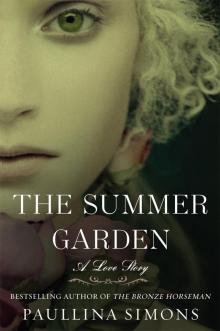 The Summer Garden
The Summer Garden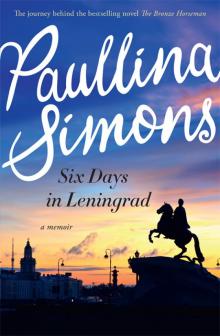 Six Days in Leningrad
Six Days in Leningrad Bellagrand
Bellagrand Tatiana and Alexander
Tatiana and Alexander Road to Paradise
Road to Paradise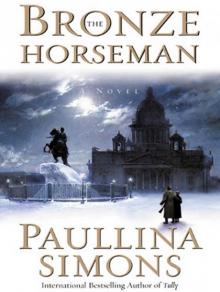 The Bronze Horseman
The Bronze Horseman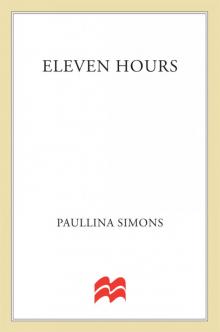 Eleven Hours
Eleven Hours Tatiana's Table: Tatiana and Alexander's Life of Food and Love
Tatiana's Table: Tatiana and Alexander's Life of Food and Love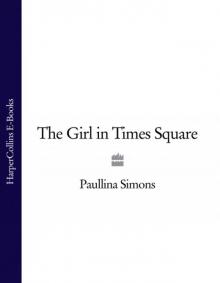 The Girl in Times Square
The Girl in Times Square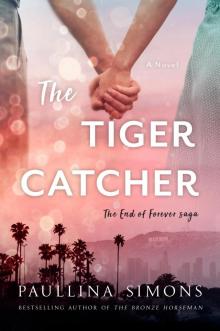 The Tiger Catcher
The Tiger Catcher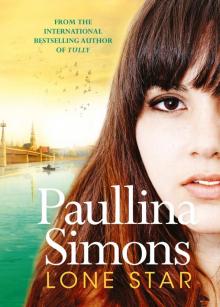 Lone Star
Lone Star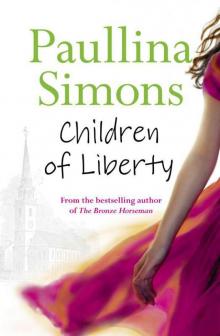 Children of Liberty
Children of Liberty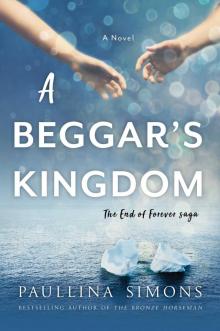 A Beggar's Kingdom
A Beggar's Kingdom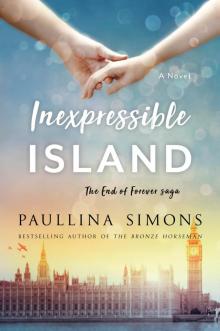 Inexpressible Island
Inexpressible Island Tatiana and Alexander: A Novel
Tatiana and Alexander: A Novel Tatiana's Table
Tatiana's Table A Song in the Daylight (2009)
A Song in the Daylight (2009)